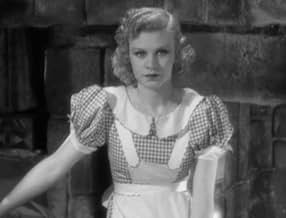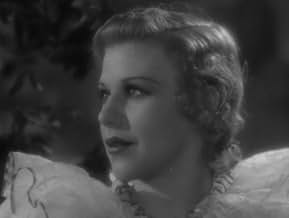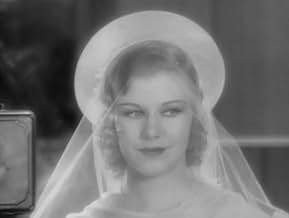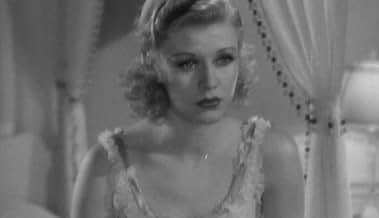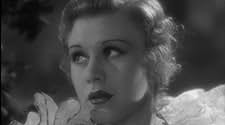Agrega una trama en tu idiomaA vice-free radio singer wants to experience the dark side of life, so a press agent convinces her sponsor to choose a "professional sweetheart" from her fans.A vice-free radio singer wants to experience the dark side of life, so a press agent convinces her sponsor to choose a "professional sweetheart" from her fans.A vice-free radio singer wants to experience the dark side of life, so a press agent convinces her sponsor to choose a "professional sweetheart" from her fans.
- Premios
- 1 premio ganado en total
William Bailey
- Reporter
- (sin créditos)
June Brewster
- Jim Kelsey's Secretary
- (sin créditos)
Kernan Cripps
- George - Radio Station Desk Man
- (sin créditos)
Betty Furness
- Blonde Reporter
- (sin créditos)
Winter Hall
- Minister
- (sin créditos)
Theresa Harris
- Vera - Glory's Maid
- (sin créditos)
Grace Hayle
- Fat Reporter
- (sin créditos)
- Dirección
- Guionista
- Todo el elenco y el equipo
- Producción, taquilla y más en IMDbPro
Opiniones destacadas
Ginger Rodgers shines in a role that might have been written for Jean Harlow. She cracks wise, hurls insults, and dances around in her underwear. Zazu Pitts is priceless as the gushing and gullible small town reporter. Franklin Pangborn is more blatantly gay here than we normally get to see him. This movie touches on many aspects of celebrity that remain true to this day. The manipulation of a public image and the team of professionals that that requires. The all important "product", the selling of which is the reason for everything. This movie is also amazingly tolerant and socially progressive for it's time. The attractive black housekeeper's character is more of a friend to Ginger, who's footloose lifestyle she envies. Pangborn's character as one of her handlers is made obviously gay without degradation or judgement. Don't expect "Dinner at Eight", but "Professional Sweetheart" is sparkling and breezy pre-code fun!
Ginger Rogers stars in "Professional Sweetheart," a 1933 film that also stars Norman Foster, Allen Jenkins, Gregory Ratoff, Franklin Pangborn, Theresa Harris, and Frank McHugh. Rogers plays Glory Eden, radio's Purity Girl, representing Ippsie Wipsie Washcloths. As the Purity Girl, Glory can't be anything but pure. Glory finds this annoying. All she's interested in is drinking, smoking, going to Harlem, wearing sexy clothes, and, if one reads between the lines, losing her virginity.
Her handlers decide to fix her up with a pure Anglo-Saxon, found in the Kentucky Mountains. They choose a nice-looking fan (Norman Foster) and set the two up, even having a wedding on the air. Knowing of her discontent, Kelsey Dish Rags is after her, too, and know she hasn't re-signed with Ippsie yet. The two engage in battle, and find there's a third party involved - Glory's new hubby, who takes Glory at her word about wanting to live in a Kentucky cabin and have a cow.
This is a cute film that could have been lots better, but the script isn't great and the pace drags a bit. Rogers is adorable, funny and sexy. Theresa Harris plays her maid, Vera, and is apparently uncredited, but she has a decent-sized, showy role.
As far as the film being pre-code, don't look for anything too racy. There is only some innuendo and Rogers in her skivvies.
Okay film, nothing special.
Her handlers decide to fix her up with a pure Anglo-Saxon, found in the Kentucky Mountains. They choose a nice-looking fan (Norman Foster) and set the two up, even having a wedding on the air. Knowing of her discontent, Kelsey Dish Rags is after her, too, and know she hasn't re-signed with Ippsie yet. The two engage in battle, and find there's a third party involved - Glory's new hubby, who takes Glory at her word about wanting to live in a Kentucky cabin and have a cow.
This is a cute film that could have been lots better, but the script isn't great and the pace drags a bit. Rogers is adorable, funny and sexy. Theresa Harris plays her maid, Vera, and is apparently uncredited, but she has a decent-sized, showy role.
As far as the film being pre-code, don't look for anything too racy. There is only some innuendo and Rogers in her skivvies.
Okay film, nothing special.
The early scenes in this 1933 RKO quickie are genuinely funny, as we are introduced to "Ipsy-Wipsy, the washcloth of dreams" and its spokeswoman, the Purity Girl. There's a strong cast and some clever repartee. Unfortunately it all starts to peter out around halfway through, hurt by an unconvincing romance between the leads, a convoluted plot that doesn't seem to know how it should end, and a less-than-breakneck pace.
Mainly of interest to fans of Ginger Rogers and the well-stocked cast of bit players who surround her.
Mainly of interest to fans of Ginger Rogers and the well-stocked cast of bit players who surround her.
Mostly boring pre-code comedy with some nice direction and very few laughs. With a cast like this, it really should be better. The story is about a radio star (Ginger Rogers) known as America's Sweetheart who wants to live it up and go dancing, drinking, having sex, etc. So her PR team compromises by getting her a husband: a rube from Kentucky (Norman Foster). Some slightly saucy pre-code dialogue seems to be the main selling point for many. But it's still pretty tame stuff. Ginger dancing around in her underwear and one scene where she gets spanked are the movie's racier moments. Funniest scene is when Frank McHugh cons the rube into proposing. Ginger gives it her best but the script just isn't strong. Only a must for hardcore Ginger fans.
"Professional Sweetheart" was Ginger Rogers' first film for RKO studios after she left Warner Bros., and with Allen Jenkins and Frank McHugh in the supporting cast it almost seems like a Warners film in exile. It's a marvelous movie, smart and funny, with a script by "Chicago" author Maurine Watkins that, though it isn't a crime story, takes up another of Watkins' favorite themes: media manipulation and the gap between what we're told about celebrities and what they're really like. In "The Fred Astaire and Ginger Rogers Book," Arlene Croce wrote, "Almost any Ginger Rogers role is successful to the degree that it reflects the dualism in her personality (tough-vulnerable, ingenuous-calculating) or plays on her curious aptitude for mimickry or fantasy or imposture." Croce was writing about the major roles of her post-Astaire career "Bachelor Mother," "Tom, Dick and Harry," "The Major and the Minor" but it applies here just as well; by casting Rogers as a wise-cracking hard-bitten orphan girl forced to pose as the "Purity Girl," and having two radio sponsors and a husband (from an arranged marriage!) all with their own ideas of what they want from her, "Professional Sweetheart" gives Rogers an early showcase for the characteristics that would have made her an enormous star even if she'd never set foot on a dance floor with Fred Astaire. I can't understand why some of the other commentators on this film have criticized Watkins' script, since it seems to me to be well constructed and vividly satirical on celebrity and its discontents in a way that rings true even today.
Another thing I liked about "Professional Sweetheart" is that it's one of the Gayest movies Hollywood ever made so much so that I can't understand why TCM isn't showing it in their current "Screened Out" festival of Gay and Lesbian films when some other titles with much more peripheral Gay content did make their list. The supporting actors seem to be competing as to who can be the queeniest, with Franklin Pangborn (not surprisingly) winning: his looks of horror and disgust when any of the other characters suggests that he date a woman are priceless. Also pretty astonishing, even for the relatively liberal "pre-Code" era in Hollywood history, is Sterling Holloway's obviously cruising Allen Jenkins at the reporters' reception imagine a Gay scene involving Jenkins in which he's the butch one!
Another thing I liked about "Professional Sweetheart" is that it's one of the Gayest movies Hollywood ever made so much so that I can't understand why TCM isn't showing it in their current "Screened Out" festival of Gay and Lesbian films when some other titles with much more peripheral Gay content did make their list. The supporting actors seem to be competing as to who can be the queeniest, with Franklin Pangborn (not surprisingly) winning: his looks of horror and disgust when any of the other characters suggests that he date a woman are priceless. Also pretty astonishing, even for the relatively liberal "pre-Code" era in Hollywood history, is Sterling Holloway's obviously cruising Allen Jenkins at the reporters' reception imagine a Gay scene involving Jenkins in which he's the butch one!
¿Sabías que…?
- Trivia"Professional Sweetheart" was Ginger Rogers' first film for RKO and - ironically, since so much of the plot revolves around getting Rogers' character to sign a radio contract - she had not yet signed a long-term contract with RKO when she made this film. She would sign a contract with the studio later in the year, just before making Volando a Río (1933), her first film with Fred Astaire.
- ErroresWhile undressing in her bedroom, Miss Glory complains she's not allowed to wear any makeup when she is very plainly wearing excessive amounts of makeup, including lipstick and heavy black eye makeup, in that scene.
- Citas
Glory Eden: I wanna sin and suffer, and now I'm only sufferin'.
- ConexionesFeatured in The Love Goddesses (1965)
- Bandas sonorasMy Imaginary Sweetheart
(uncredited)
Music by Harry Akst
Lyrics by Edward Eliscu
Performed first by Ginger Rogers (dubbed by Etta Moten)
Performed later by Theresa Harris
(who may have been dubbed by Etta Moten)
Selecciones populares
Inicia sesión para calificar y agrega a la lista de videos para obtener recomendaciones personalizadas
Detalles
- Tiempo de ejecución1 hora 13 minutos
- Color
- Relación de aspecto
- 1.37 : 1
Contribuir a esta página
Sugiere una edición o agrega el contenido que falta

